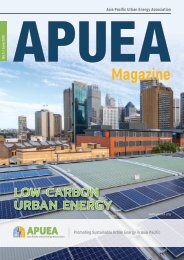APUEA Magazine-no.6 September 2019
You also want an ePaper? Increase the reach of your titles
YUMPU automatically turns print PDFs into web optimized ePapers that Google loves.
<strong>APUEA</strong> <strong>Magazine</strong> | No.6 / <strong>September</strong> <strong>2019</strong><br />
Interview with<br />
Mr. Somboon<br />
Lertsuwannaroj<br />
Impact Solar<br />
Limited<br />
The solar PV industry today hardly needs any<br />
introduction as it fills the headlines of the<br />
news more or less every day with updates<br />
on projects all over the world. With a clear<br />
trend of dropping prices, it is clear that solar<br />
PV systems are getting more traction in the<br />
energy market. To get an insight into the<br />
solar PV industry in Thailand, we met up with<br />
Mr. Somboon Lertsuwannaroj, who is the<br />
Managing Director of the Bangkok-based<br />
energy company, Impact Solar Limited.<br />
During the interview, we discussed the solar<br />
industry in Thailand, touching on policy,<br />
regulation, business models, barriers, the<br />
future and more.<br />
Mr. Somboon Lertsuwannaroj<br />
Managing Director at Impact Solar Limited,<br />
Bangkok, Thailand<br />
Q: Can you give an introduction to Impact Solar Limited?<br />
Impact Solar Limited is a privately-owned Thai company based in Bangkok and is a subsidiary of Impact<br />
Electrons Siam (IES), which was founded in 2011 with a focus on clean energy development. Our<br />
business includes solar farms and wind farms, and we sell power to the state-owned utility companies<br />
and private companies through long-term Private Power Purchase Agreements (PPA) in Japan, Thailand,<br />
and Laos. Our project portfolio in Thailand has an installed power capacity of more than 70 MW.<br />
In 2015, Thailand had a policy for rooftop solar PV systems which allowed for the sale of excess<br />
electricity from Solar PV systems back to the grid. It was the first time for the Energy Regulatory<br />
Commission (ERC) to fully manage and control the whole bidding process for Solar PV projects instead<br />
of the Electricity Generation Authority of Thailand (EGAT), Provincial Electricity Authority (PEA) and<br />
Metropolitan Electricity Authority (MEA) who was responsible for this in the past. However, the<br />
selection process was disappointing as the final selection at the final application round was made by<br />
lucky draw. The government did not select from readiness, skill, or track record because they did not<br />
want to be sued by companies that fail in the bidding process. Due to this fact, we believed that it would<br />
be a good idea to start selling power by ourselves to roof owners. Our evaluation showed that due to<br />
the cost and the technical solution of solar PV systems in Thailand as well as the fact that solar<br />
radiation is very high in the whole country. We believed that we could bring down the cost to compete<br />
with the government at the time.<br />
14




